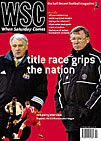 The League of Ireland has yet to reap any benefit from the national team's success. But plans are afoot to revive the domestic scene. Paul Doyle reports
The League of Ireland has yet to reap any benefit from the national team's success. But plans are afoot to revive the domestic scene. Paul Doyle reports
In the Irish High Court in early February, a man was sent to prison for rape. Two minutes later, the judge re-emerged from his chambers to rule on a case between the Football Association of Ireland and Shelbourne, one of the country’s biggest clubs. You could understand if the judge found it all quite trivial, but most League of Ireland fans were in raptures when he found in favour of the FAI.
That was not because the FAI are popular, indeed they are hardly even tolerated by fans of the domestic game, who are still furious at the way in which they squandered much of the wealth accumulated by Ireland’s previous World Cup odysseys on planning for a pie-in-the-sky new national stadium. No, LOI fans were happy because had Shelbourne won, the renaissance of domestic football would have been still-born.
Shels went to court over the “Marney Affair”. Paul Marney is a midfielder who played for Shelbourne’s Dublin rivals St Patrick’s Athletic in the first three matches of this season, despite being unregistered. League rules stipulated St Pats should have been immediately deducted three points for each match Marney played in, but the authorities decided a fine would suffice. Rival clubs were furious and three appealed against the decision. That eventually resulted in table-toppers St Pat’s losing nine points. St Pat’s demanded independent arbitration. The arbitrator decided to give them the points back. So Shels, by now the leaders, went to the High Court. They lost, St Pat’s kept their points, and the season may now actually finish in time.
In time, that is, for the launch of an all-new Irish football product: football in summer. Yes, in a bid to finally lure the average Irish football fan out of his armchair, from where he religiously follows the English Premiership, the new LOI season will kick off in July, when the only other football on TV is the sort that even Sky are embarrassed about screening.
It’s a bold move, and means going head-to-head with Gaelic football and hurling, still the most popular sports everywhere bar Dublin, but League of Ireland clubs, with average home attendances of about 3,000, know it represents the only hope of earning enough money to stem the flow of young players to Britain.
A strong Irish showing at the World Cup might prompt fans to go along to their local ground afterwards. Then again, it might not. After all, only one of the Irish players likely to go to Japan ever played in the League of Ireland. Admittedly, former Cobh Ramblers midfielder Roy Keane is one of the best in the world, but that doesn’t change the fact that the gulf between the LOI and football’s top level is immense.
Even though the gap has shown signs of closing in recent years – results in Europe are improving – summer football must succeed if clubs such as Shels and champions Bohemians, who have both gone almost fully professional in recent years, are to prosper. Clubs are optimistic, as proved by the fact that Bohemians earlier this month offered prolific striker Glen Crowe a new four-year contract worth a reported £200,000, by far the most generous deal ever awarded to a local player and one whose value increased recently when the government announced a 40 per cent tax break for domestic players.
Crowe’s case is interesting for other reasons, too. His form has been such that Mick McCarthy invited him to train with the Ireland squad before the crucial World Cup qualifier with Portugal last May, feeding hopes that a national league player may soon be called up to the senior squad for the first time since 1986.
Most significant of all, however, is that Crowe has made a success of himself despite flopping in England (he had spells at Wolves, Exeter and Plymouth). For years, Irish players who didn’t make it in England returned home disenchanted and simply gave up football. Crowe has shown you can now make it big in Ireland too, and before signing his new contract he afforded himself the luxury of brushing aside offers from at least two English clubs.
The trend is catching. January’s Player of the Month was the young Shelbourne centre-back Kevin Doherty, who returned home to Dublin after four years in Liverpool’s reserves and has since won a call-up to the Irish Under-21 squad. And the FAI, finally trying to develop local football rather than just concentrating on the national teams, have launched a programme hosted by Dublin City University aimed at salvaging the careers of youngsters spat out by English clubs.
But perhaps the most symbolic success story doesn’t involve Irish talent at all. LOI fans rejoiced last month when Bohemians captain Kevin Hunt also signed a new deal – despite receiving several offers to return to his native England.
From WSC 182 April 2002. What was happening this month